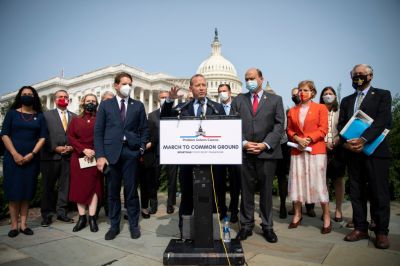But First …
In the Book of Judges, we read that, facing a ruthless invasion, “the Israelites prepared shelters for themselves in mountain clefts, caves, and strongholds.” There were no bomb shelters then. The Israelites planted their crops, and the invaders “camped on the land and ruined the crops all the way to Gaza ... like swarms of locusts.” In our time, the Israelis are people who want peace and trade but are surrounded by people who want war and the spoils of war, and who want, above all, the extermination of the Jewish state.
This column was written before the sneak attack on Israel from Gaza over the weekend, and I will have more to say about the situation in the coming days. For now, the thing that is most on my mind is that people who take children as hostages and then parade them through the streets as spoils of war are not soldiers and do not deserve to be treated as such. Whatever legitimate grievances the Palestinians might have had, their cause today is one that is covered in shame that will never be washed away. For now, courage to our friends—and with the United States increasingly under the sway of people who do not know how to take their own side in a fight, Israel is going to need all the friends she can get.
Jackassobins
I get why Republicans in the so-called Problem Solvers’ Caucus are big mad at the Democratic caucus members who did not cross party lines to keep Kevin McCarthy from being deposed as speaker of the House by self-serving beady-eyed cretin Rep. Matt Gaetz. Gaetz, as it turned out, had only a handful of Republicans on his side: Of the 216 votes to give McCarthy the boot, only eight came from Republicans, while the remaining 200-odd votes came from Democrats—a very strange way of punishing McCarthy for being too bipartisan, which is what he notionally stood accused of. Gaetz and his brand of performative nonsense politics is a problem that could have been, if not solved, then very much improved by responding to his imbecility with a crushing political rejection. Instead, Democrats gave him a bare victory, ensuring that the problem gets worse rather than better.
Some “problem solvers.”
Not that there weren’t good reasons for Democrats to vote against McCarthy. For one thing, there isn’t any pressing reason for Democrats to vote for any Republican for speaker. For another thing, McCarthy has done more than enough to create the very perverse political incentives that brought him down. McCarthy’s individual demerits as speaker—his championing of Donald Trump’s stolen-election nonsense, his hamstringing the January 6 investigation, his elevation of cranks and bigots such as Marjorie Taylor Greene—are surely enough that any self-respecting Republican (if we could imagine the existence of such a creature) would think twice about voting for him for speaker in normal circumstances. Kevin McCarthy is not a victim of the destructive and moronized politics of our era—he is one of the principal architects of those destructive and moronized politics, a leading destroyer and moronizer. If there had been some way for both McCarthy and Gaetz to lose at the same time, that would have been a better outcome—decent people could have just stood on the sideline and cheered for collateral damage.
But, if you are going to call yourselves a “Problem Solvers’ Caucus” and talk a good game about putting pragmatism over partisanship, then you have to do that from time to time. You cannot promise to put pragmatism over partisanship only when it doesn’t help the other party.
Republicans are a special kind of hot mess right now, but Democrats are wading into the same tainted waters, even if they have not yet sunk quite as deeply into them. The political incentives for the Democrats are about the same as they are for the Republicans—politics driven by social media frenzy, cable news hysteria, and small-dollar donations looks pretty much the same on the left as it does on the right.
If it seems that Republicans are a bit worse at the moment—and they are—there are a few obvious reasons for that fact that are worth understanding and pondering for a bit: One of them is the particular, unique character of Donald Trump, who as a genuine celebrity had the power to warp the politics of the right, which is so starved for celebrity and so keenly aware of its relative paucity of celebrity advocates that conservatives get just terribly excited by figures such as Scott Baio and Ted Nugent—and it has been a long time since Superbabies: Baby Geniuses 2 or Double Live Gonzo! were top-of-mind. Trump didn’t get into this as a guy who was “Fox News famous” but as a guy who was actually famous. The second and related factor that should be understood is that the right-wing populists who have been drawn to Trump feel shut out of elite institutions and estranged from elite culture. A lot of that is just kayfabe, of course: Ted Cruz of Princeton, Harvard Law, and Take Your Spouse to Work Day at Goldman Sachs isn’t some hay-chewing rustic who spent his youth rasslin’ steers in Amarillo. But some of it is real—Sen. Cruz’s Big Tex shtick works for a reason.
This second factor involves two subfactors: One is the obvious resentment that our so-called nationalists have for almost everything in these United States that is successful and globally significant (Wall Street, Silicon Valley, Hollywood, the Ivy League, etc.), and the second is that this estrangement from elite institutions ends up giving right-wing counter-institutions power that is wildly disproportionate to their actual influence and importance. For example, it is common (and not always wrong) to compare Fox News with MSNBC, and while both cable channels are full of intellectually dishonest and morally stunted partisan hacks making a racket that sounds exactly like a truckload of Chinese opera gongs crashing into a truckload of untuned player pianos, MSNBC does not have anything like the influence over Democratic politics that Fox News has had—and still has—over Republican politics. Democrats often say that they want to build something like the network of right-leaning think tanks, policy shops, and media outlets that cater to Republican interests, but what they do not seem to appreciate is that they already have it: It is called Harvard, the New York Times, the American Bar Association, ABC, NBC, CBS, CNN, the late shows, NPR, PBS, etc. For years, National Review—a relatively small magazine with fewer than 200,000 subscribers at the apex of its prominence—had at least as much influence over right-leaning politics as a behemoth like the New York Times did over left-leaning politics, because National Review was pretty much the only outlet talking to the right as such, while the New York Times had to compete for influence with the Washington Post, CBS Evening News, the law faculty at NYU, etc. Fox News has tremendous power over Republican politics because the second-place contender for doing what Fox News has done is talk radio, which in the post-Rush Limbaugh era is a fractious collection of half-bright schemers and grifters who either already have Fox News shows, are angling to get Fox News shows, or recently lost their Fox News shows.
The fewer significant variables you have in your system, the more important each of those individual variables is. It is an easier thing to corrupt one cable news channel than to corrupt a dozen of them.
If that reads to you like a long and tortuous disquisition about Republicans’ problems, know that it is very much to the point of what ails intraparty Democratic politics as well. Sure, a few Democrats—from the Problem Solvers’ Caucus or elsewhere—could have crossed over and defeated Rep. Gaetz’s misadventure, even at the risk of doing something that is good for the Republican Party as a whole and that redounds to the specific benefit of the graceless and unsympathetic McCarthy. But you can be sure that if House Minority Leader Hakeem Jeffries had done such a thing, then the Democratic answer to Matt Gaetz—Alexandria Ocasio-Cortez or Cori Bush or whoever—would have tried to do to Jeffries approximately what Gaetz did to McCarthy. By that I do not mean necessarily to drive him out of of his leadership position, but instead to play the old “stabbed in the back” game, telling everybody’s favorite story about how the good and pure true believers once again got sold out by the collaborators and insiders and click here to donate to my new super PAC. I’ll confirm this immediately after I type it, but I am 100 percent confident that there is at least one headline out there reading, exactly, “Democrats must not save McCarthy.”
(And … yes, here’s one.)
Being, as I often have confessed, basically an Eisenhower Republican (which is no kind of Republican at all Anno Domini 2023), I am generally much more enthusiastic about bipartisanship, compromise, and consensus than are those on the right who define “virtue” as “whatever it is that most annoys the Democrats.” That group believes any bipartisan consensus is necessarily tainted—doubly tainted!—by virtue of its being 1. bipartisan and 2. a consensus. The problem involves that much-abused term, virtue signaling. Bipartisanship, compromise, and consensus are not necessarily good and desirable on their own: For much of the late 19th and early 20th centuries, to take one example, the bipartisan, consensus position was to do pretty much nothing about the civil rights of African Americans, which was the result of a compromise between the parties (conservative, business-oriented Republicans of the Coolidge era were notionally in favor of civil-rights reform but did not make a top priority of the issue) and a compromise within the Democratic Party (with northern labor leaders and southern segregationists united against what Andrew Jackson had called “the money power” and willing to put African-American interests on the back burner in the interest of economic realpolitik). There isn’t necessarily any virtue in consensus, as any reading of American history will show.
Moreover, nice-sounding words like “compromise” and “bipartisanship” simply do not have enough content on their own to provide the foundation for a stable political settlement. Any consensus upon which a big change in national policy is based will have to be a genuine consensus, one arrived at through argument and persuasion, not one arrived at because somebody thought “consensus” sounded like a nice thing to pursue. The need for real consensus is why, for example, we are going to have decades more abortion politics after Dobbs, which, far from settling the abortion issue, only marked the beginning of the effort to achieve a consensus for an eventual legislative settlement (more precisely, 50 or so legislative settlements). You can have a problem solvers’ caucus that pursues consensus remedies to national problems only where there is, in fact, a real consensus. The one we probably are nearest to has to do with the national fiscal situation. You wouldn’t know it to hear the cable news, talk radio, and campaign-stump wailing, but there is a general, quiet acknowledgment among responsible people in both parties that our federal fiscal position is unsustainable and dangerous, that the recent rise in interest rates has added urgency and immediacy to the issue, and that any meaningful program of mitigation is going to include both spending reductions (in the form of reduced future entitlements) and tax increases. That’s a pretty broad consensus, in a sense, but it also is a very narrow one—it is a vaguely defined agreement among a relatively small minority of political players. That may not sound like much, but it is, in fact, a pretty good start.
The agreement will get broader and deeper, and it will grow better defined, in the months and years ahead—let us just hope that we reach the point of consensus and deliberate action before we reach the point of crisis and forced action, because crisis and forced action leave a bitter aftertaste. How much of our current political unhappiness really has its roots in the 2007-08 financial crisis and the bailouts they produced, a dramatic federal intervention that seemed to change the rules in the middle of the game to the benefit of the most connected and powerful people and businesses in the country? I happen to think that what we got (a Ben Bernanke-organized bailout) was better than the most likely alternative (a Nancy Pelosi/Harry Reid-organized bailout), but I understand why people were shocked and angered by that dramatic departure from laissez-faire.
The cheap and urgent partisanship of the here-and-now will almost always trump the cheap and less urgent desire to present oneself to polite society as a centrist, moderate, problem solver. Put another way: There is a big difference between calling yourself a problem solver and actually being one, between pledging to support hypothetical solutions that fall within your own political limits—“I’ll support it, if I can support it!”—and doing the work of hammering out those supportable compromises. That’s the lesson to be learned from Democrats’ voting—without one exception—to let the Republican agents of chaos have their way with the House leadership just so that Democrats can spend the next 13 months or so smugly pointing out that Republicans agents of chaos are … Republican agents of chaos, which everybody already knows. Politicians are not going to vote against their political interests—creating new and better political interests to enable politicians to do the right thing is one of the tests of real political leadership. So is helping people—including, especially, rivals—understand when they have miscalculated their own interests. Stamping your feet and saying, “But I’m the king, damn it!” doesn’t make the guillotine go away, but a little bit of intelligent compromise has prevented more than a few revolutions. It is more fun to be a Jacobin, of course, but that’s how you end up empowering jackasses (jackassobins?) such as Rep. Gaetz.
Self-proclaimed problem-solvers won’t save you. But solving a few problems might help.
Economics for English Majors
Why does it seem like the investor class is so often in the position of rooting against the U.S. economy? You know the story: “Employment is up, markets are down.” From the Wall Street Journal:
The hiring pickup in September could make Federal Reserve officials less confident that inflation’s decline this summer will be sustained. Even so, Friday’s report is unlikely to resolve their debate over whether to raise rates again. Officials will pay close attention to the September consumer inflation report to be released next Thursday and to how concerns about stronger growth are already leading to higher borrowing costs in bond markets.
But, don’t worry—at least wages aren’t going up!
For the Federal Reserve, the inflationary implications of strong payroll growth were offset by a relatively benign reading on wages. Total hourly earnings rose just 0.2% and were up 4.2% from a year earlier. In the last three months they were up 3.4% annualized, which if sustained, would be compatible with 2% inflation. This was partly because of outsized growth in low-wage sectors, but even within those sectors, wages are soft. Leisure and hospitality earnings were flat for the month and for non-management employees, were up just 0.1%. For private education and healthcare workers, earnings rose just 0.2%.
Basically, the issue is this: In the long term, the stock market likes strong economic growth, stable money, and high levels of productivity. In the short term, the market likes great roaring rivers of cheap money slushing through the economy, giving investors many opportunities to dip their hands into the rushing stream and scoop up some cash. In the long term, everybody wants to be fit and healthy. In the short term, there’s a banana split and a bottle of bourbon right there for the taking. We’re all Cotton Mather in the long term, and we’re Hunter Biden in the short term.
Specifically, here, the markets are worried that if employment, wages, consumption, etc., are too strong, then inflation will continue to be a nasty and intractable problem, and the only anti-inflation tool Uncle Stupid has in his toolbox is higher interest rates. If you have big-ticket items to sell—like houses or new cars—higher interest rates are your enemy, because they put downward pressure on prices, which is what they are supposed to do. If you are a business looking to expand your operations, then higher interest rates are your enemy, because financing for your new project or new production facility is going to cost you a lot more—which, again, is exactly how higher interest rates reduce inflation, i.e., by interfering with economic activity per se. Loan me $1 billion at 1 percent and I’ll take that money and make a pile of money in excess of my debt-service obligations; loan me $1 billion at 11 percent and I’ll probably pass.
Inflation is a nasty, disruptive business. We largely avoided it for years and years and years, but now that we have inflicted it upon ourselves, there is no easy way out.
Words about Words
“True equality is embracing mediocrity,” says the actress Aparna Nancherla. Of course, she is right—which is another reason “true equality” is undesirable. Equality under the law? Yes, of course. Genuine equality and the mediocrity that necessarily goes along with it? No, thank you. I have cited this passage from Russell Kirk many times before, but it remains necessary at a time in which the American people seem to be hell-bent on the “narrowing uniformity and deadening egalitarianism of radical systems,” including the ghastly conformist regimentation upon which right-wing radicalism is constructed:
Conservatives pay attention to the principle of variety. They feel affection for the proliferating intricacy of long-established social institutions and modes of life, as distinguished from the narrowing uniformity and deadening egalitarianism of radical systems. For the preservation of a healthy diversity in any civilization, there must survive orders and classes, differences in material condition, and many sorts of inequality. The only true forms of equality are equality at the Last Judgment and equality before a just court of law; all other attempts at levelling must lead, at best, to social stagnation. Society requires honest and able leadership; and if natural and institutional differences are destroyed, presently some tyrant or host of squalid oligarchs will create new forms of inequality.
Ideas are slippery, but most people can remember a few words, and so we settle on a handful of words that are stripped of their actual meaning and given an unspoken new meaning: “that which is desirable.” Among these words are “equality” and “democracy.” Nobody believes in “true equality” when it comes to choosing a spouse or selecting a doctor for a sick child—gradations, rankings, and hierarchies come into play in those situations. Nobody wants “democracy” when it comes to running a family, a business, or, most of the time, even a government. We don’t hold a plebiscite to determine whether someone is guilty of a crime, and, in most cases, the judges who oversee those trials are not elected. (Elected judges are right up there with elected senators and the modern primary system as the greatest examples of excessive democracy.) Our most cherished liberties—freedom of speech, of the press, of religion—are not subject to approval by voters. The most important things are beyond democracy.
And the most important things are likewise beyond considerations of “true equality.” Aparna Nancherla was, I suppose, being wry, but the point of view she adopted is one that is widely and earnestly—and wrongly—held.
People Always Tell You
Los Angeles Times: “Feinstein reigns for one last day at San Francisco memorial.” Here in the United States, no one “reigns.” We do not have that kind of government—we have a republic. My condolences to the family of Sen. Feinstein and to the families who raised the editors at the Los Angeles Times. As it says in Forrest Gump—I mean the much less cheerful novel, not the treacly film—“being an idiot is no box of chocolates.”
Speaking of Squalid Oligarchs …
This essay on the so-called New Right’s search for a “Red Caesar” is worth consulting if only for the links. An excerpt:
Thomas Merrill is a political theorist and an associate professor at American University in Washington DC, who has written critically on the Claremont Institute, but from a broadly conservative perspective.
“We’re cousins,” he said of Claremont intellectuals in a telephone conversation, “and sometimes you have to ask your cousin, what the hell are you doing?”
He said that the authoritarian drift exhibited in work like Anton’s was an example of “the Claremont guys shooting themselves in the foot.” For Merrill, while he agrees that the ideas are dangerous, he thinks they have an air of compensatory fantasy.
“They’re selling a very dark picture of the world to conservative donors without going out and doing the hard work of democratic politics.”
“Compensatory fantasy” is pretty much the whole thing, where this is concerned. What’s been going on in Trump-centered and Trump-adjacent politics all these years isn’t politics at all, but half-assed group therapy in the form of the world’s most embarrassing role-playing game.
Now, That’s Journalism
A real Muppet News Flash from the Washington Post: “Where do all those Music City or Big Easy or L.A. musicians come from? For that, our best bet is birthplace.”
Well, yeah?
And here is your box of chocolates, Washington Post.
Elsewhere
Detroit doesn’t matter. From my New York Post column:
Now that the long national nightmare of the writers’ strike has come to a close—did anybody notice?—we may at last turn our attention to another unhappy and increasingly irrelevant union work force being challenged by Korean imports: the UAW strike. What Squid Game is to Hollywood writers, the Hyundai sedan is to the U.S. auto industry—a product that has the bosses wondering what, exactly, they are getting for those inflated union wages at home. The thing is: Detroit doesn’t matter. Not very much, not in the big picture.
Give it a read!
You can buy my most recent book, Big White Ghetto, here.
You can buy my other books here.
You can see my New York Post columns here.
Please subscribe to The Dispatch if you haven’t.
I’ve been enjoying hosting Dispatch Live. Check it out.
And, for Dispatch members only: Behold, the Skiff.
In Closing
I’ve been thinking a little about King Charles X of France, the ultra-royalist who came in after the post-Napoleon restoration of the French monarchy. I kind of feel like I know the guy—or, at least, I know the type. Charles was forever lecturing his more moderate brother and predecessor, King Louis XVIII, about the need to be tough, to take a hard line, to never give an inch, etc. His brother mostly ignored his advice and did well in doing so. When Charles took the throne, he tried to follow his own advice, positioning himself as an unyielding absolutist. Naturally, he weakened the monarchy and ended up being driven from the kingdom, bringing to a close his branch of the royal line. (He was succeeded by his cousin, the more liberal—at least in theory—Louis Philippe I.)
There is a difference between talking tough and being tough, and a big difference between insisting that you have power—or even having that power on paper—and actually being able to wield that power. A weak man who thinks he is a strong man is a danger to himself and others. But what is so often misunderstood is that it is the very things the would-be strong man holds in contempt—compromise, self-restraint, flexibility—that makes leaders and institutions strong, while it is the very things that the would-be strong man holds dear—self-aggrandizement, worship of the iron fist, inflexibility—that makes leaders and institutions weak. If you think about the U.S. presidents who were certified tough guys—I mean men with body counts—they weren’t strutting gladiators: They were men such as Ulysses Grant, Harry Truman, George H.W. Bush, and, of course, George Washington, who had the strength of character to let go of power when he could have held onto it and, in doing so, became probably the greatest man of his time.
All of us guys are supposed to be thinking about the Roman empire all of the time, and there is a whole great American cottage industry of books and essays drawing parallels between the American scene and the Roman one. Others will insist that this moment is something like pre-revolutionary France or Russia, that the master key is reading War and Peace or Coriolanus, or watching Glengarry Glen Ross or The Empire Strikes Back. Which scenario should we look to? All of them, of course. Nothing ever changes, because people never change. And if they do change, they do not change very much or very quickly. Charles X is long gone, but he’s still right here.







Please note that we at The Dispatch hold ourselves, our work, and our commenters to a higher standard than other places on the internet. We welcome comments that foster genuine debate or discussion—including comments critical of us or our work—but responses that include ad hominem attacks on fellow Dispatch members or are intended to stoke fear and anger may be moderated.
With your membership, you only have the ability to comment on The Morning Dispatch articles. Consider upgrading to join the conversation everywhere.